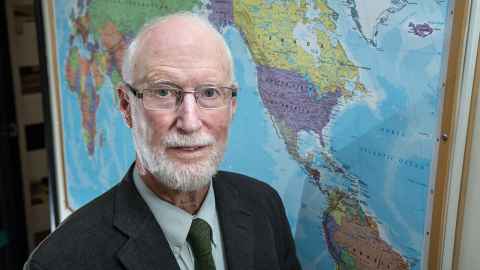Will 2018 bring deeper disasters or rebounding reforms?
10 January 2018
Opinion: Amidst a growing clump of global concerns, University of Auckland’s Stephen Hoadley reveals why he’s picking 2018 won’t be a year of catastrophe.

Given the sour taste of 2017, could 2018 be even more bitter? Or has the world ‘bottomed out’ and resumed the upwards trajectory it has enjoyed for most of the past half-century?
Last year began with United States President Donald Trump’s inauguration, descended to the Brexit vote, endured migrant surges, North Korean missile threats and lone-wolf terrorist attacks, and ended with a renewed Palestinian intifada against Israel triggered by – yes – Donald Trump.
Along the way disgruntled Europeans elected a brace of anti-immigration parties, and Saudi Arabia contributed to civil war and starvation in Yemen, the latest human-made disaster. Syria’s murderous President Assad remained in power, backed by Russia and Iran. As the United States dithered, China continued its menacing military modernisation and construction of new bases in the South China Sea and the Indian Ocean littoral.
And the planet grew warmer, the polar caps thinner, the seas higher, and the weather worse.
Pessimistic political analysts predicted the further undermining of the stable international order constructed in the post-World War II era that underpinned rising standards of living and declining poverty. Economists wondered if economic nationalism would end globalisation and precipitate a new global financial crisis. Social commentators noted worsening inequality and crime, and a predicted erosion of the norms of tolerance and civic cooperation. Environmentalists foresaw severe natural disasters caused by climate change, over-exploitation of natural and animal resources, and environmental despoliation.
While I share each of these worries, I don’t recommend despair. Each is balanced by positive signs offering potential for reform – or at least the postponement of catastrophe. In short, I predict the following for 2018.
- North Korea will not attack the United States with nuclear missiles, and President Kim Jong-un will declare victory when not attacked by President Trump. We will learn to live with a nuclear-armed North Korea.
- President Trump will not attack North Korea and will declare victory when his officials begin talks to reduce tensions. We will learn to adapt to President Trump’s tweets.
- President Xi Jinping will concentrate on China’s New Silk Road vision and on distributing economic benefits more widely at home, and will not threaten South China Sea commerce because China needs the sea lanes for its own trade. Southeast Asian governments, and New Zealand’s, will accommodate China to gain economic benefits.
- President Vladimir Putin will bluster but decide that further military advances into Eastern Europe are too risky, and will concentrate on consolidating political power at home and selling oil and gas to Europe and China.
- Chancellor Angela Merkel will stitch together a German coalition government and, with President Emmanuel Macron of France and European Council President Donald Tusk, will re-energise the European Union despite Britain’s impending exit.
- Europe’s traders will bypass the US and negotiate economic agreements directly with the East Asia ‘tigers’, thus stimulating the growth of world trade.
- Violence in the Middle East will decline to tolerable levels, suppressed by authoritarian governments and moderated by superficial ‘peace processes’.
- The Islamic State will not revive, even though its remnants, jihadist thugs and warped social media converts, will murder innocent people in small numbers in diverse places during 2018.
- Wild weather, David Attenborough’s documentaries, and good sense will convert more people and their governments to support conservation policies and climate change mitigation efforts.
- New Zealand’s Labour-led government will set a sterling example of child poverty alleviation while sensibly managing foreign investment, debt, tourism, and immigration, in contrast to neighbouring Australia. The world will hardly notice. Perhaps that’s a good thing, so we can be left alone to enjoy life in 2018.
Dr Stephen Hoadley is an Associate Professor of Politics and International Relations in the Faculty of Arts at the University of Auckland. His research interests span the foreign and security policies of New Zealand, Asia, the United States, Europe and the Middle East, the politics of trade, and international human rights institutions.
This article reflects the opinion of the author and not the views of the University of Auckland.
Used with permission from Newsroom, Will 2018 bring deeper disasters or rebounding reforms? published on Wednesday 10 January 2018.